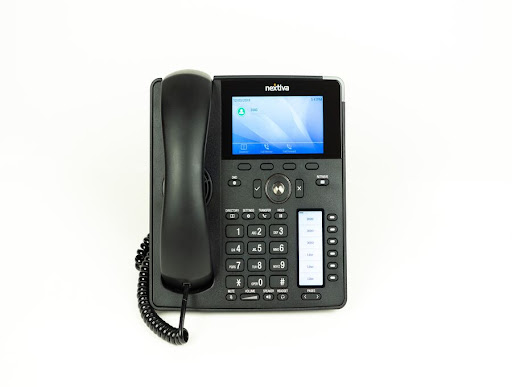Welcome to the digital age, where communication has evolved by leaps and bounds! In this fast-paced world, staying connected is not just a necessity but a way of life. And that’s where Voice over Internet Protocol (VoIP) phone systems come into play. VoIP technology has truly revolutionized the way we communicate, making traditional landlines seem like ancient relics in comparison. So, if you’re ready to dive into the exciting world of VoIP, buckle up as we explore how it works, its benefits and drawbacks, and how it’s transforming communication as we know it. Get ready for a journey filled with innovation and connectivity!
What is VoIP?
VoIP, short for Voice over Internet Protocol, is a cutting-edge technology that allows you to make phone calls using an internet connection instead of traditional telephone lines. Gone are the days of relying solely on landlines or mobile networks; VoIP brings your communication into the digital realm.
So, how does it work? Well, VoIP converts your voice into a digital signal and transmits it over the internet. This means that you can make calls from any device with an internet connection – whether it’s your computer, smartphone, or even a specialized VoIP phone. No more being tied down to one location!
One of the biggest advantages of VoIP is its cost-effectiveness. Traditional phone systems often come with hefty bills and long-distance charges – not to mention expensive hardware upgrades. With VoIP, you can say goodbye to those unnecessary expenses as most service providers offer affordable plans and unlimited calling options.
But wait, there’s more! VoIP also opens up a world of flexibility and scalability. Whether you’re running a small business or managing remote teams across different locations, this technology allows you to easily add or remove lines as needed without any hassle.
However, like everything in life, there are some downsides too. Since VoIP relies on an internet connection for call quality and reliability issues may arise if your network experiences downtime or poor bandwidth capacity. Additionally,a power outage could render your devices useless unless they have backup power sources.
In conclusion (without saying “in conclusion”), VoIP truly transforms communication by leveraging the power of the internet. Its ability to provide cost savings and flexibility makes it highly appealing in both personal and professional settings alike.
How does VoIP work?
VoIP, or Voice over Internet Protocol, is a technology that allows phone calls to be made over the internet rather than traditional telephone lines. But how does it actually work?
Instead of transmitting voice signals through copper wires like landline telephones do, VoIP converts audio into digital data packets and sends them across an IP network. These data packets are then received by the recipient’s device and converted back into voice signals.
To make a VoIP call, you need a reliable internet connection and a device capable of handling the service. This can include smartphones, computers, or even specialized VoIP phones. Once connected to the internet, you can place calls to both landline and mobile numbers using your preferred VoIP provider.
The magic behind this technology lies in its ability to compress audio files for faster transmission while maintaining high-quality sound. Additionally, because everything is transmitted digitally, VoIP also enables other features such as video conferencing and instant messaging.
VoIP phone system offers businesses and individuals an affordable alternative to traditional phone systems with added flexibility and advanced features. It’s no wonder why more and more people are switching to this revolutionary communication method!
The benefits of VoIP
The benefits of VoIP (Voice over Internet Protocol) have revolutionized communication in the digital age. One major advantage is cost savings. With traditional phone systems, long-distance and international calls can rack up hefty bills. VoIP, on the other hand, allows for unlimited calling within a fixed monthly fee, regardless of distance. This is especially beneficial for businesses with clients or offices located across the globe.
Another benefit is flexibility and scalability. Traditional phone systems require physical lines to be installed and additional hardware to be purchased when expanding or moving locations. With VoIP, users can easily add or remove lines as needed without any complicated setup processes.
VoIP also offers advanced features that enhance productivity and collaboration. Features like call forwarding, voicemail-to-email transcription, video conferencing, and virtual receptionists help streamline communication processes and improve efficiency.
Furthermore, VoIP enables mobility as it can be accessed from anywhere with an internet connection. Users can make or receive calls using their smartphone or laptop while traveling or working remotely.
Integration with other business tools is another advantage of VoIP technology. It seamlessly integrates with customer relationship management (CRM) software and team collaboration platforms to provide a unified communication experience.
The disadvantages of VoIP
While VoIP systems have numerous advantages, it’s important to also consider the potential disadvantages that come with this technology. Here are a few drawbacks you should be aware of:
1. Dependence on Internet connection: Since VoIP relies on an Internet connection, any issues with your network or power outage can disrupt your communication. This can be problematic if you heavily rely on phone calls for business purposes.
2. Quality of service: The quality of voice and audio in VoIP calls may not always match that of traditional landline phones. Factors like bandwidth limitations, latency, and packet loss can affect call clarity and lead to dropped or distorted conversations.
3. Emergency services: Unlike traditional landlines that automatically transmit location information to emergency services, VoIP requires users to register their physical address manually. In an emergency situation where every second counts, this extra step could potentially delay help from reaching you.
4. Reliability during disasters: During natural disasters or emergencies when power outages occur, VoIP systems may become inaccessible if backup power sources are not available or properly configured.
5. Security concerns: Just like any other digital communication system, there is always a risk of security breaches with VoIP. Hackers could intercept calls or gain unauthorized access to sensitive information transmitted over the network.
It’s essential to weigh these disadvantages against the benefits before making a decision about implementing a VoIP system for your business or personal use.
How VoIP is changing communication
VoIP (Voice over Internet Protocol) has emerged as a game-changer in the world of communication. With its revolutionary features and capabilities, VoIP is transforming the way people connect and communicate in the digital age.
One of the key ways that VoIP is changing communication is by providing greater flexibility and mobility. Gone are the days when you were tied to your desk phone; now, with VoIP, you can make and receive calls from anywhere with an internet connection. Whether you’re at home, in a coffee shop, or on a business trip abroad, you can stay connected effortlessly.
Moreover, VoIP allows for seamless integration across various devices. You can use your laptop, smartphone, or even tablet to make calls using your VoIP system. This means that regardless of which device you have on hand at any given moment, you can still stay connected without missing important calls or messages.
Another significant way that VoIP is transforming communication lies in its cost savings potential. Traditional phone systems often come with hefty monthly bills due to long distance charges and expensive international calling rates. However, with VoIP’s ability to transmit voice data over the internet rather than traditional telephone lines, these costs are significantly reduced.
ConclusionAs we have seen, VoIP systems are truly revolutionizing communication in the digital age. With their ability to transmit voice and data over the internet, these systems offer a host of benefits that traditional phone lines simply cannot match.
VoIP technology allows for greater flexibility and mobility, enabling users to make and receive calls from anywhere with an internet connection. This has opened up new possibilities for remote working, collaboration, and global business expansion.
Additionally, VoIP offers cost savings by eliminating the need for separate phone lines and reducing long-distance call charges. Businesses can also benefit from the scalability of VoIP systems, easily adding or removing users as needed without any hassle or additional expenses.
However, it is important to note that there are some disadvantages to using VoIP. The quality of calls may be affected by factors such as internet connection stability and bandwidth limitations. It is crucial for businesses to have reliable internet service providers and sufficient bandwidth to ensure high-quality communications.
Despite these drawbacks, it is clear that VoIP is changing communication dynamics in significant ways. Its affordability, flexibility, scalability, and advanced features make it an attractive choice for individuals and businesses alike.










